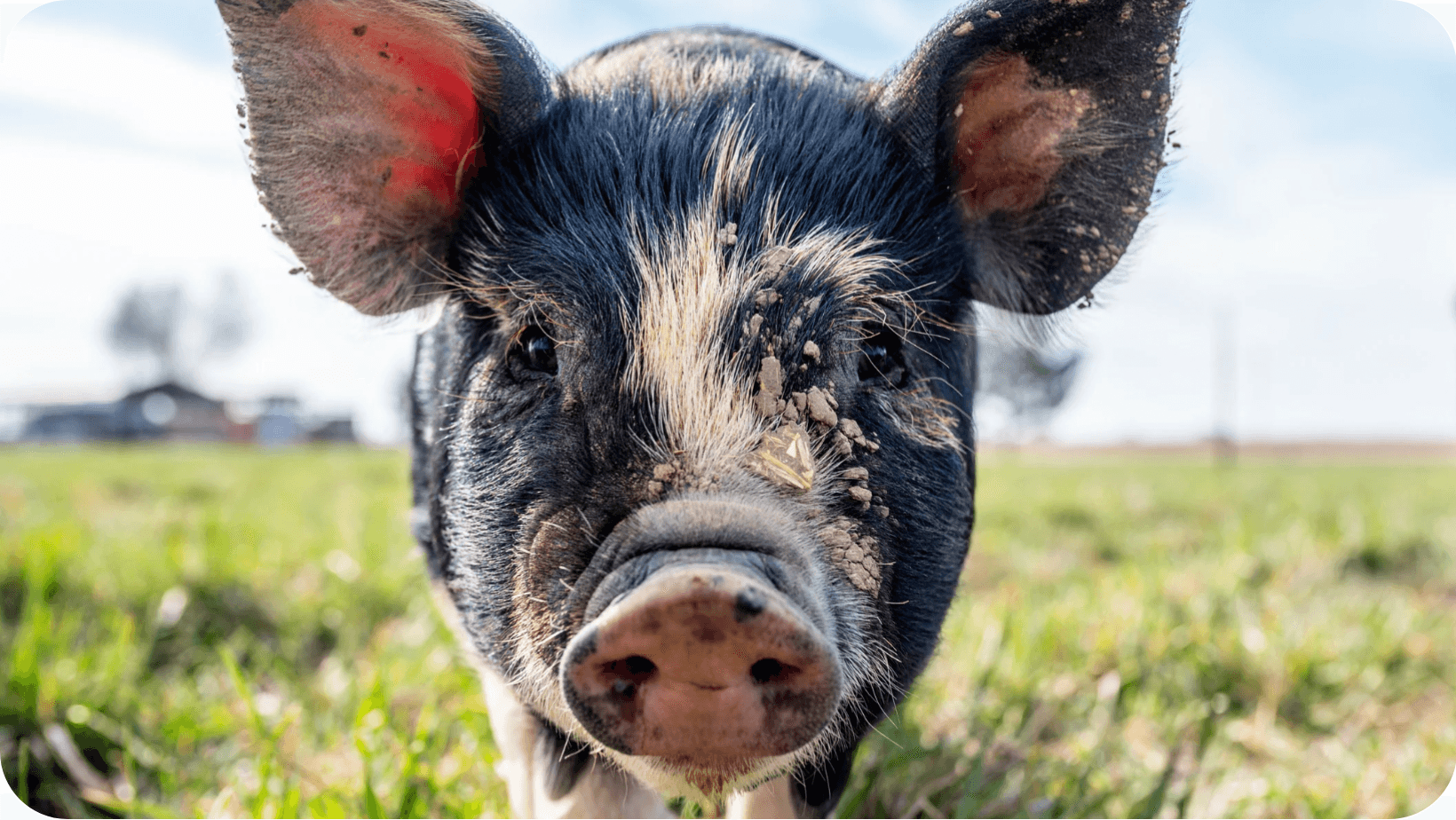Exploring the controversial Viva! campaign: Are you an animal lover?
The UK’s leading vegan campaigning charity Viva! made headlines this week with its ‘Are you an animal lover?’ campaign.
The controversial PR stunt was led by Viva! Founder, Juliet Gellatley, and co-founder of plant-based food company THIS!, Andy Shovel, displaying dead animals on the back of a truck at iconic locations throughout London, asking the question: ‘Are you an animal lover?’
A pretend cat and dog hung from butcher's hooks labelled ‘pet’ whilst a real slaughtered pig hung beside them labelled ‘animal.’
“This stunt serves as a reminder that the beef burger you order or the bacon sandwich you cook isn’t a faceless ingredient; the only distinction between a deceased pig and a deceased cat or dog is your perception,” Viva! Founder, Juliet Gellatley, said in a statement.
The UK is renowned for being a nation of animal lovers, with Brits sharing their homes with a diverse selection of animals. Recent statistics show that over 10 million UK households share their home with dogs, 8.2 million with cats, and another 1.5 million with birds and small mammals, and 49% of the British public consider their animal companion a part of the family.
The definition of family can vary, but for the most part, a family member is someone we care for deeply and enjoy spending time with. Yet, whilst an estimated 35 million animals across the UK considered as loved and cherished family members and homed as pets, in stark contrast, there are over 1.2 billion land animals that we kill and consume as food.
Which gives pause to question; do people in the UK truly love animals, or do we only love our pets?
Rob Percival, author of The Meat Paradox theorises, "In every society, old and new, from the Arctic to the Amazon, East to West, animals are placed in categories. Some are 'food,’ others are 'not food,’ and the latter category often includes 'pets.’ Some scholars think this is a way of channelling our empathy. Killing 'food' animals can be disturbing, so we tactically withdraw moral concern from these species and focus that concern on our chosen category of 'non-food' animals. In our society, to give one example, this leads us to treat pigs and dogs very differently, despite their evident similarities in cognition and sentience."
The ethical inconsistencies of routinely slaughtering and eating billions of animals whilst homing and bonding with others is certainly difficult to comprehend logically.
After all, what is the difference between a dog and a pig, other than that we choose to love one, and to eat another? Dogs are incredibly loving companions and are welcomed family members amongst humans, and yet we mass breed, confine, and slaughter over 10 million pigs in the UK each year, when multiple studies have shown that pigs are incredibly affectionate, with an intelligence level higher than dogs, equal to that of a five-year-old child.

Brett Sayles/Pexels
In the UK, pigs are slaughtered at the age of four to seven months old, either in groups by gas asphyxiation, or hoisted by their hind legs and bled out via the throat. This is deemed humane slaughter in the UK, and yet, if this was the method of killing dogs for human consumption, would we feel the same way?
The very idea of eating puppies instead of pigs, is unfathomable to many, with the Yulin Dog Meat Festival in China widely petitioned and protested against, but is what we do to pigs, cows, chickens, lambs, deer, pigeons, turkeys, ducks, pheasants, fish, and many other UK animals any different?
If we love and cherish dogs, cats, and the many other creatures we share our homes with, why can’t that love be extended to all animals? Is the vegan concept of equality for all creatures from land, sea, or sky, so outrageous or extreme as some believe it to be?
Sadly, for many people, the carnistic response is that it is.
Carnism is the concept that it is natural, normal, necessary, and nice (known as the Four N’s) for humans to use and consume animals for the products we use daily, from flesh and organs for food, to skin and furs for clothing, etc.
The term was popularised by Beyond Carnism’s President Melanie Joy in her book Why We Love Dogs, Eat Pigs, and Wear Cows. This has led to much-needed discussions on why we harm some animal types whilst protecting others, and how this varies in different cultures.
The discussion of carnism vs veganism highlights Western culture's somewhat hypocritical views on how other countries treat animals. Misleading advertising campaigns play a vital role in this; it is widely believed amongst animal lovers that the UK has outstanding animal welfare, when multiple investigations prove this to be untrue.
Currently, two of every three animals are factory farmed in the UK.
The grim reality of life for farmed animals across our country has been documented thoroughly in recent years, with charities such as Viva! creating an award-winning exposé: HogWood: A Modern Horror Story; Ed Winter’s sharing the hidden truth within UK farming in his (free to watch) documentary Land of Hope and Glory and MILK; and Joey Carbstrong’s recently released Pignorant (available to watch free on Amazon Prime UK).
So where does this leave animals?
The back and forth between carnism and veganism is a debate that could continue for aeons. And for animals living within the agricultural world, time is short. Painfully so. It is a little-known fact that most animals killed for food in the UK are slaughtered within their first year of life. Some, in the first months, weeks, or in many cases, the first days.
For further resources on animal-free nutrition see how to get B12 as a vegan, and if you’d like to try great-tasting vegan food, check out our food & drink section, we’re spoilt for choice!
